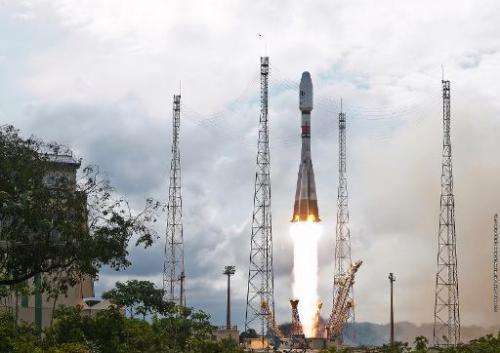This photo handout by the European Space Agency taken on July 10, 2014 and released on July 11, 2014 shows a Soyuz rocket lifting off from Kourou, French Guiana
Europe is set to launch two satellites Thursday for its Galileo navigation system, boosting the number in the Earth-orbiting constellation to six and bringing the network a step closer to becoming operational after a long delay.
The two are scheduled to blast off on a Russian-made Soyuz rocket from Kourou in French Guiana at 1231 GMT, according to the European Space Agency.
They should reach orbit at an altitude of about 23,500 kilometres (14,600 miles) in just under four hours, and are expected to become operational in the "autumn"—the September-November period in Europe, an ESA statement said.
The Galileo constellation, a rival to the US Global Positioning System and Russia's Glonass, will ultimately comprise 27 satellites and three reserves.
The network seeks to provide an alternative in case of signal failure on the existing GPS and Glonass systems, and will have search and rescue capabilities.
The first orbiter pair were launched in October 2011 and the second a year later.
This week's launch, of the first operationally-capable satellites dubbed SAT 5 and SAT 6, had been delayed for a year due to "technical difficulties in the setting up of the production line and test tools," the space agency said.
Four satellites were due to have been launched in 2013.
When this did not happen, ESA director-general Jean-Jacques Jordain said in January that 2014 should see the launch of six satellites, paving the way for initial satnav services to start by the end of the year.
However, the ESA now expects to send just one more satellite pair into space by "end of year 2014".
"Then the constellation will be gradually deployed with six to eight satellites launched per year," it said.
According to the ESA website, 18 satellites should be able to provide initial services to users "by mid-decade", with full services from the full 30-part constellation "scheduled for the decade's end".
In March last year, the ESA said Galileo's first four test satellites had passed a milestone by pinpointing their first ground location, with an accuracy of between 10 and 15 metres (32 to 49 feet).
For its ninth liftoff from the Guiana Space Centre on Thursday, the Soyuz rocket will carry a total load of 1.6 tonnes (3,500 pounds), including the two satellites weighing 730 kilogrammes (1,600 pounds) each.
Galileo, budgeted at 5.4 billion euros ($7.2 billion) is fully financed by the European Commission.
© 2014 AFP
























